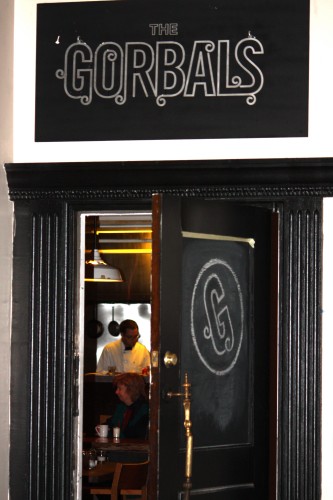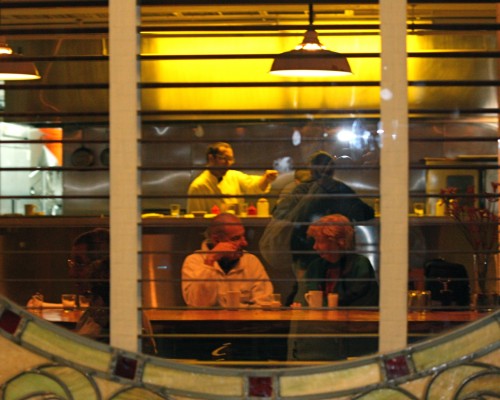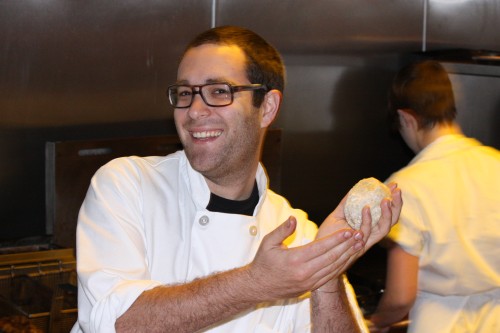Feature by Willard Manus
The Gorbals is ready for its closeup.
No, Hollywood hasn't decided to make a movie about Glasgow's once-notorious slum district; nor does The Gorbals figure in a new Billy Connolly comedy routine.
The Gorbals
is simply the name of a new restaurant which opened recently in downtown
Los Angeles. Located in the lobby of the Alexandria Hotel (at Fifth &
Spring Streets), The Gorbals is the creation of 28-year-old Ilan Hall,
who in 2007 took first prize on Top Chef 2, American TV's highest-rated
cooking show. Ilan was born to an Israeli mother and a Scottish father
who grew up in The Gorbals, part of a German-Jewish family that had fled
Hitler in 1938.

Ilan's childhood was spent in Great Neck, Long Island, where his parents
had emigrated after having met at a bar mitzvah in Glasgow. Great Neck,
an upper-middleclass enclave about an hour east of New York City, had
an excellent high school, but Ilan chose to attend a small "progressive"
school which catered to non-conformist, disaffected kids like himself.
"I've always had a hard time with authority and rigidity," he said. "I could never have functioned in a normal school with tight-ass teachers and administrators."
There were about fifty kids in his school. There was no dress code, no taking of attendance or specific academic requirements. Kids came and went as they pleased, studied what they liked, addressed teachers by their first name. Free-wheeling as the school was, Ilan still had behavior problems.
"He was always in trouble," recalled his boyhood friend, Nathan Zion (who is now partnered with Ilan at The Gorbals). "He was heavily into punk rock, especially the Sex Pistols. He wore punk clothes, dyed his hair different wild colors every week. He was an outsider even among outsiders, kept pushing the envelope every chance he could."
Ilan is still pushing the envelope. Though he's put punk rock and rainbow hair behind him, he's still marching to his own drum, defying perceived wisdom and advice. "Most people in the restaurant business think I'm crazy to have opened a new place at this particular time, with the economy in the dumps," he acknowledged.
"They
point to the fact that the number of people visiting restaurants in L.A.
has plunged for four consecutive quarters, and that many wellknown places
have shut their doors for good."
On top of that, the downtown area he settled on has had a checkered history.
In the early part of the last century, Spring Street was known as the
Wall Street of the West. The Pacific Stock Exchange building stood here,
surrounded by dozens of beaux-arts banks that were funding L.A's first
major building boom.
The boom's prize attraction was the Alexandria Hotel, which opened its doors in 1906 and for the next two decades was the swankiest, most prestigious hotel in Los Angeles. Notables like Teddy Roosevelt, Woodrow Wilson and Winston Churchill slept here, as well as such showbiz luminaries as Rudolph Valentino, Enrico Caruso, Sara Bernhardt and Charlie Chaplin.
Chaplin in particular loved the Alexandria and, in 1919, rented its luxurious, 196-foot ballroom to announce the formation (with Mary Pickford and Douglas Fairbanks) of United Artists.
By 1930, though, the Alexandria had been eclipsed by the newly opened Biltmore Hotel. The swells and celebs drifted away, leaving the Alexandria to begin a slow, sad descent into seediness. By the 1970s, the hotel, along with most of the neighborhood around it, had become neglected and dilapidated, a magnet for junkies, winos and other bottom-feeders.
The Stock Exchange and the banks went out of business and soon turned into vandalized shells. The east side of downtown L.A. became an asphalt jungle, the grafitti-splattered backdrop for the novels and stories of such hardboiled, noirish writers as John Fante and Charles Bukowski. Spring Street's new nickname was "Heroin Alley."
Today, the neighborhood is finally making a recovery. In the last ten years, it has been the focal point of a city-led urban renewal program. New owners took over the Alexandria (from a Japanese company) and renovated its 500 rooms, turning them into rental flats. The area around the hotel has been gentrified as well, with cafes, galleries and boutiques slowly pushing out the liquor stores, check-cashing shops and Mexican food marts.
Still, there is an underlying grittiness to Fifth and Spring. Drunks and druggies stagger around in the streets, and just a few blocks away hundreds of homeless hunker down at night in cardboard boxes.
"I'm well aware of these problems," Ilan said. "I know I'm taking a chance with The Gorbals. But I've lived in this area for the past two years and I know from personal experience that it's a happening place, a place with real character and spirit. It's also an emerging culinary scene, with 40% growth in recent years."
He pointed to the fact that the number of lofts in the resurrected towers has tripled since 2000. The blocks around Fifth and Spring are now among the most densely populated corners of the city.
"Believe it or not, the neighborhood has become a small town with big buildings," he said. "I can walk down Spring Street, or have breakfast at the nearby Earth Cafe, and recognize most of the people I meet. That's why I love it here. I've got a 1300-square-foot loft in a new building with a swimming pool on the roof. I could never have anything like that in New York."
Ilan has another reason to feel optimistic about The Gorbals' chances: he is quite famous because of Top Chef 2. I discovered that when I recently had dinner at the restaurant and found myself sitting next to a table full of young Asian-Americans--four women and one man, all of whom had become fans of his during the TV show's 2007 season.
"He was by far the most likable contestant," one of the girls said. "He was ambitious and driven, but not obnoxious and selfish like his main competition, a French guy named Marcel Vigneron who was a real asshole who wouldn't even share his burners with anyone else."
It also helped that Ilan was handsome: six feet tall, slender, with close-cropped brown hair and black horn-rim glasses--think Clark Kent. They rooted hard for him over the course of the twelve-week season which, like most reality shows, was rife with backstabbing, meltdowns and near brawls. They cheered when Ilan walked away with a first prize of $100,000 and a fully-loaded Sears Kenmore kitchen.
"We've followed his career ever since and when he announced in his blog that he was opening The Gorbals, we quickly made plans to dine here."
"What does the name of the restaurant mean to you?" I asked them.
"Haven't got a clue," came one answer.
"I think it's a place in Scotland," was the next.
"Don't be silly. A gorbals is a mouse with long hind legs and a tail!" insisted the third.
On being asked how they liked the food, one of them, Puneet, replied, "It was great. Absolutely fabulous."
"Even better," said the girl sitting beside him, "was meeting Ilan himself. He's even more gorgeous in person!"
When I quoted this remark to Nathan Zion, he smiled understandingly. "Ilan has always been surrounded by women. I can't even remember how many girlfriends he's had. It's not just that he's handsome; women can't resist a guy who's willing to cook for them."
The cooking urge manifested itself early in Ilan's life. His father did most of the cooking at home and was a strong influence on him. "Dad was an open-minded chef," Ilan said. "He mostly cooked the Scottish/Jewish dishes he had grown up with in the Gorbals, but he also experimented with Mediterranean and Asian cuisines."
"Food was always on Ilan's mind, from the time he was small," Nathan said. "Every time we went out to a restaurant, he did all the ordering. We trusted him implicity, even when his choices were far out. He was a courageous eater too, ready to try any and everything."
Ilan was also influenced by a favorite cousin who worked as a chef in restaurants around the world. "It was a nomadic but romantic life," Ilan recalled. "Hanging out in the south of France, cooking at a Terence Conran place in London. And every time I'd see him, he'd have a better-looking girlfriend."
At seventeen, Ilan decided to become a chef. He signed up for a pre-professional summer-long course at a small cooking school in Florence. "It was a great experience," Ilan recalled. "I really grew up there. I learned Italian, took classes not just in food but wine; there I was, at seventeen, sampling wines from all over the region! I learned the Tuscan way of doing things in the kitchen--keep it simple, but do it the right way, the time-honored way."
On his return to the USA, Ilan enrolled for a two-year study program at the Culinary Institute of America, in upstate New York.
"This was a bigtime institution," he said. "It was like a college--thousands of students, tall buildings, a campus, dormitories. The teachers were mostly German and Swiss chefs, but the emphasis was on French food. The courses were tightly organized, fast-paced, precise, thorough."
The curriculum dictated a break at the halfway point, during which time students were sent to work as apprentices at various New York city restaurants. Ilan was assigned to an elegant restaurant called Aureole. "It was a reality check," he said. "I had to work like a dog, sixteen hours a day, six days a week. It was like boot camp: the chefs screamed at you, made you do all kinds of dirty work. They also played tricks on you, sent you running to a shop six blocks away for 'a can of steam.' It was the French method of training a chef, of toughening you up, of testing your passion and resolve."
Ilan lost sixteen pounds the first month, suffered from burnt hands and a punctured ego, but he stuck it out and managed to get a diploma from the CIA. He began his professional career at Craft, a famous Manhattan bistro run by one of Top Chef's judges, Tom Coliccho. Before long, he began clashing with the chef de cuisine, Damon Wise, and got fired. "I'm good friends with him now," Ilan said. "He's apologized and so have I. I was young and obnoxious."
Ilan then took a job at Casa Mono, another haute-cuisine NYC eatery. "I fell in love with Spanish food during my two years there." When he was tapped to compete on the TV show, Ilan was granted leave by the Casa Mono bosses. "They were really good about giving me time off."
When he won the Top Chef crown, Ilan decided to take a break from cooking. He embarked on a wanderjahr in Europe and Asia, traveling at his own pace, being a tourist, sampling new foods wherever he went. His favorite place to eat?
"It was a mom-and-pop restaurant in Guadaloupe, on Spain's Costa Brava. The husband was a fisherman; the wife cooked up whatever he caught that day. It was simple and perfect."
One of his stops was Scotland, a country that was familiar to him, having first visited it when he was fifteen. "My father took me to The Gorbals and showed me where had had grown up. It had changed of course, but his stories still resonated with me. I got a real feeling for the place and its history and inhabitants."
During that last Glasgow visit, Ilan did most of his eating in pubs. "I love the meat pies they serve there and the great beers. My favorite place to eat in Glasgow, though, was Sloan's, which I believe is the city's oldest restaurant."
Ilan's father, Roy Hall (who runs a hifi-components business out of his Great Neck home), still has many relatives and friends in Glasgow. Ilan looks forward to spending time with them in future--and to trying out new pubs and restaurants.
He believes that modern Scotland's cuisine should place a stronger emphasis on seafood. "The very best thing I've tasted to date in Scotland was a plate of oysters at Loch Fyne."
Once he was back in New York, Ilan made a life-changing decision to relocate to Los Angeles. "It was a big move, but I think a good one for me," he said. "New York is just too competitive. There are all these nasty food bloggers and as for the chefs, it's like a dissing contest. I'd rather be in a place where chefs are welcome. There's space in L.A. for new places and things that people haven't seen, Also, the weather is nicer."
It was while driving cross-country with his girlfriend (of-the-month) that he came up with the idea of opening a restaurant called The Gorbals.
"The name just popped into mind," he said. "When I told my girlfriend, she said, 'it's perfect.' Then I called my father and he of course loved the idea, was even touched by it."
Ilan wanted to have a small restaurant with a focused menu and a casual, communal atmosphere that would appeal to young people. Although he loves Catalan-style food, he decided against a strictly Spanish menu. "I wanted to have complete freedom as a chef."
The Gorbals occupies a space in the Alexandria that was once a diner. Ilan kept the diner's stone floor, but tore out everything else. With its open kitchen, small bar and white walls (which are devoid of decorations), The Gorbals is not just casual but barren. The long wooden table that occupies center stage and the smaller tables and chairs surrounding it were all built by Ilan and Nathan.
"We had to save money by doing a lot of the work ourselves," Ilan admitted. "Our budget took some big hits from certain of the city's bureaucrats."
The Gorbals opened in August, 2009 and immediately attracted the food critic of the L.A. Times, who described the restaurant as "the oddball creation of Ilan Hall, season 2's winner of Top Chef. A wee Scottish, a wee Jewish, his downtown eatery reflects his own ethnic makeup with a creative twist."
Just as quickly, the fire department showed up and decided that The Gorbals' new boilers were a hazard and had to be replaced. Next came a building inspector who insisted that its plumbing wasn't up to code either.
"It was all a lot of crap," Ilan said bitterly, "but we were obliged to shut down and start ripping up floors and pipes."
It took two months and tens of thousands of dollars to redo The Gorbals. When it opened for a second time in November, 2010, Ilan and Nathan threw a big party for themselves. "Although our place can only seat 70, we crammed three hundred into it. We had a ball!"
When my
wife and I first went there for dinner, we were presented with a menu
that offered eleven dishes--make that "savories." We chose the
butternut squash latkes with sage; the bacon-wrapped matzoh balls with
horseradish mayonnaise; and the Manischewitz-braised pork belly with clapshot
and mustard.

Ilan, aided by three sur chefs, prepared our food, which was served on
small plain dishes but was indeed savory and remarkable, with distinct
tastes that lingered long after on the palate. We finished with a Scottish
sweet: sticky toffee pudding topped with vanilla ice cream and maldon
salt (whatever that is). The bill, without wine or coffee, came to $40.
We asked Irv Fineman, a Scottish-American friend who had grown up in the Gorbals, to visit the restaurant and give us a second opinion. "I must admit that when I first looked at the menu and saw things like bacon-wrapped matzoh balls and haggis burger, I thought the cuisine would be something of a joke. But then I started eating and soon realized that I was being served food of the highest order. It was a revelation, what this young chef could do with commonplace things like haggis and shepard's pie!"
The next time my wife and I went back to The Gorbals it was for a post-theatre nightcap. Even at that late hour, the place was about half filled. Ilan had dimmed the lights and turned up the sound system, which pumped out ear-splitting rock music. I watched him work. Dressed in a T-shirt, jeans and white jacket, he seemed driven, completely unlike the lowkey, easygoing chef we had observed earlier. He kept barking at his helpers and complaining about their work. I later learned that he fired all three of them the next day.
"All
chefs, even Ilan, are divas," Nathan confided with a knowing smile.
"I don't think you can even be a chef if you don't have a big, over-the-top
personality."

When Ilan was done cooking, he took off his jacket and crossed to our table with a snifter of Scottish malt whiskey in hand. I asked him how business was going. "We've yet to fill the place for dinner," he admitted.
"I'm not worried," he added quickly. "We lost momentum when we had to shut down in August, but I think we're getting it back. The food critics and bloggers keep finding us, so I think word of mouth will begin to spread. Also, we plan to start serving lunches fairly soon, to the business people who work in downtown L.A."
Ilan pointed out that they were also doing a brisk side business in catering. "Los Angeles is a big convention and party town," he said. "We cooked recently for four hundred people attending a function at the Design Center, for example. I brought in my old nemesis, now-friend, Marcel Vigneron, to help cook with me."
Ilan insisted that even if The Gorbals' bottom line continued to bleed red ink, they could survive by taking on more catering jobs. When I ran this statement by a restauranteur friend, owner of a small trattoria in Beverly Hills, he said: "Catering private parties and hosting business gatherings can be a lucrative business, but it's a fickle one and immensely competitive. I'd hate to have to peg my future on it."
It's clear then that the future of The Gorbals is an uncertain one. The restaurant could become a downtown institution or a recession statistic. It's also clear that Ilan is still a non-conformist at heart. The Gorbals closes at random hours and the phone tends not to be answered. The chalkboad "open" sign stands outside the entrance whether the restaurant is serving food or not.
Ilan finally admitted to me that "the next three or four months will decide our fate." But then, after rubbing his tired, unshaven face and taking a sip of malt whiskey, he slapped a hand down and said, "We're not going to fail, dammit! I just won't let it happen!"
I looked at him, seeing the same determination and resolve that had enabled him to leave home at 17, survive boot camp, become a chef, win a national TV competition, open his own restaurant at 27. And I believed him.
(The Gorbals, 501 S. Spring St., Los Angeles. 213-488-3408. Open from 6pm to 2am. www.thegorbalsla.com)
